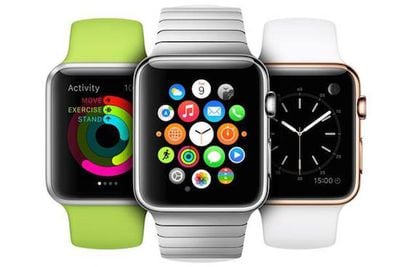Apple and Aetna Talked Data Privacy, Cost and More in Apple Watch Meeting
Apple and insurance provider Aetna met last week to discuss ways to offer discounted Apple Watch models to Aetna's 23 million subscribers, and CNBC has shared details on some of the topics that were discussed at the meeting, attended by Aetna employees, Apple executives, and health providers from major hospitals.
Aetna is aiming to determine whether the Apple Watch can be used by subscribers to improve health outcomes by encouraging them to exercise, eat better, and better manage health issues. Info on the meeting came from Mandy Bishop, an attendee who founded startup Lifely Insights. Much of the meeting consisted of feedback from Aetna employees who have been testing the Apple Watch.

Data privacy, including who had access to what data, was a major topic of discussion, with Apple explaining that Apple Watch health data can only be shared with third-party apps and companies with express user consent.
The Apple Watch's lack of situational awareness was brought up as a pain point, such as when the device delivers a stand notification when a user is on a plane or in another environment that makes standing difficult. Cost was also a significant topic of discussion.
One theme that emerged during the event, she said, is that many of those who were enrolled in the program wanted to get healthy alongside their families. But many couldn't afford to spend upwards of $1,000 on devices for their spouses and children.
The cost issue wasn't entirely resolved, she said, but it proved to be a sticking point. It remains unclear whether Aetna will extend its discounts from employees and/or members to their family-members.
Apple and Aetna are said to be planning to implement some kind of Apple Watch program in early 2018, which would see the company offering free or discounted Apple Watches to its subscribers.
Aetna already has a program that provides a free Apple Watch to its 50,000 employees and it already subsidizes the cost for some subscribers, with data from that program being used to determine if an expansion is worth it.
Popular Stories
Apple should unveil the iPhone 17 series in September, and there might be one bigger difference between the Pro and Pro Max models this year.
As always, the Pro Max model will be larger than the Pro model:iPhone 17 Pro: 6.3-inch display
iPhone 17 Pro Max: 6.9-inch displayGiven the Pro Max is physically larger than the Pro, it has more internal space, allowing for a larger battery and...
Since the iPhone X in 2017, all of Apple's highest-end iPhone models have featured either stainless steel or titanium frames, but it has now been rumored that this design decision will be coming to an end with the iPhone 17 Pro models later this year.
In a post on Chinese social media platform Weibo today, the account Instant Digital said that the iPhone 17 Pro models will have an aluminum...
The calendar has turned to July, meaning that 2025 is now more than half over. And while the summer months are often quiet for Apple, the company still has more than a dozen products coming later this year, according to rumors.
Below, we have outlined at least 15 new Apple products that are expected to launch later this year, along with key rumored features for each.
iPhone 17 Series
iPho...
Apple is continuing to refine and update iOS 26, and beta three features smaller changes than we saw in beta 2, plus further tweaks to the Liquid Glass design. Apple is gearing up for the next phase of beta testing, and the company has promised that a public beta is set to come out in July.
Transparency
In some apps like Apple Music, Podcasts, and the App Store, Apple has toned down the...
In 2020, Apple added a digital car key feature to its Wallet app, allowing users to lock, unlock, and start a compatible vehicle with an iPhone or Apple Watch. The feature is currently offered by select automakers, including Audi, BMW, Hyundai, Kia, Genesis, Mercedes-Benz, Volvo, and a handful of others, and it is set to expand further.
Apple has a web page with a list of vehicle models that ...
Apple's next-generation iPhone 17 Pro and iPhone 17 Pro Max are just over two months away, and there are plenty of rumors about the devices.
Below, we recap key changes rumored for the iPhone 17 Pro models.
Latest Rumors
These rumors surfaced in June and July:Apple logo repositioned: Apple's logo may have a lower position on the back of the iPhone 17 Pro models, compared to previous...
New renders today provide the best look yet relocated Apple logo and redesigned MagSafe magnet array of the iPhone 17 Pro and iPhone 17 Pro Max.
Image via Majin Bu.
Several of the design changes coming to the iPhone 17 Pro model have been rumored for some time, such as the elongated camera bump that spans the full width of the device, with the LiDAR Scanner and flash moving to the right side.
...
iPhone 17 models will feature a redesigned Dynamic Island user interface, according to a post today from Digital Chat Station, an account with more than three million followers on Chinese social media platform Weibo. The account has accurately leaked some information regarding future Apple products in the past.
The account did not share any specific details about the alleged changes that are ...
Amazon is back with its annual summertime Prime Day event, lasting for four days from July 8-11, the longest Prime Day yet. As it does every year, Prime Day offers shoppers a huge selection of deals across Amazon's storefront. With the event now underway, we're tracking numerous all-time low prices on Apple gear right now.
Note: MacRumors is an affiliate partner with Amazon. When you click a...





















